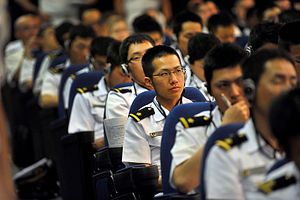With very little in the way of defense or security related legislation slated for the current extraordinary Diet session, Prime Minister Shinzo Abe’s LDP-led administration is nevertheless seeking to move forward on two related fronts outside the Diet. Both issues, the controversial state secrets law and the update to the U.S.-Japan defense cooperation guidelines, are scheduled to be enacted before the end of the year. They are both highly charged issues politically, particularly if Abe’s government seeks to enshrine its new interpretation of collective self-defense within the defense guidelines. However, it does not appear that the government feels confident enough to do so at this point.
The state secrets law is a sure thing, if not exactly popular domestically. The LDP-controlled ruling coalition, together with its junior partner Komeito, was easily able to pass the bill during last fall’s Diet session, despite sharp protests both in the media and from Japan’s fractured opposition. The law allows the government to jail both civil servants and journalists for divulging or publishing secrets related to defense, diplomacy, counter-terrorism or counter-espionage. The bill will go into effect December 10, and the government has heralded its passage as a way to increase cooperation with allies like the U.S. on matters of national security. However, the vague nature of the bill and its overarching powers (which could be used to protect information as wide ranging as the nuclear power industry) have raised concerns, with opposition MP Mizuho Fukushima saying “there are few specifics in the law, which means it can be used to hide whatever the government wishes to keep away from public scrutiny… In its current form, the prime minister can decide by himself what constitutes a secret.”
Next Wednesday, Japan and the U.S. are expected to have an interim report ready on the update to their defense cooperation guidelines, after delaying a release in late September that would have coincided with the opening of the Diet session. This will be the first update to these guidelines since 1997, and the Abe government had hoped to have its new interpretation of collective self-defense included in the revision.
However, there is a mixed impression within the Japanese media as to how far that will go. A government source who spoke with Kyodo News said the report could “include some new scenarios such as Japan intercepting ballistic missiles and defending U.S. ships in international waters.” However, the Jiji Press stated its “informed sources” said the interim report “will not reflect Tokyo’s recent decision to lift a self-imposed ban on collective self-defense,” and that “how the SDF [Japanese Self-Defense Forces] will support U.S. forces in collective defense will not be spelled out in the interim report.” Finally, the Nikkei said “the report will lay out a policy to address various possibilities… including intelligence, surveillance and reconnaissance, missile defense, the use and protection of facilities… as well as the evacuation of noncombatants to safe areas.”
Little is clear from the media as to what will or will not be actually included in next Wednesday’s report. This could be due to government sources parceling out information to different outlets, in an attempt to test different approaches and gauge public reaction. A less cynical theory would be that the government is unsure about how much of its new approach to collective self-defense it can include in the guidelines, given the public’s dislike for the new interpretation. The government has already stated it will be focusing on domestic issues and the economy this fall – probably an imperative given that the miracle of Abenomics has faltered since April’s consumption tax increase. It is likely therefore that the government will indeed hold back on including more explicit Japanese defense capabilities in the new guidelines this year, hoping to consolidate its political base, with an eye toward new legislation on the issue next year.

































